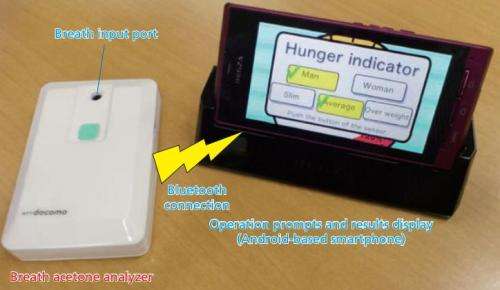Credit: Yuki Yamada
(Phys.org) —NTT Docomo, Japan's largest mobile-phone provider has developed a new smart phone peripheral that lets a person know if they are burning fat by analyzing their breath. To emphasize that the device is not a gimmick, researchers with the company conducted experiments testing how well the device worked compared with high-grade lab equipment. They have had the results of their study published in Journal of Breath Research.
Research has shown that one of the difficulties people encounter when attempting to lose weight is the lack of real-time feedback. Weight loss effort results don't typically show up for days, or even weeks, leaving those dieting and/or exercising in limbo, wondering if what they are doing is the right approach. To address such concerns, researchers with Docomo have been studying ways to provide dieters with more immediate feedback. One way they've found, is by measuring the amount of acetone in the breath.
When fat is burned in the body, one of the end products is acetone—it winds up in the blood which makes its way to the lungs and is expelled when a person breathes out. Up till now, measuring how much acetone is in the breath required expensive and bulky lab equipment. Docomo appears to have solved both problems—its device is roughly the same size as a smartphone. A user places a tube in the mouth and blows—the device measures the amount of acetone in the breath and displays a Fat Burning graphic on a smartphone screen along with an encouraging message.
Before announcing the product, Docomo conducted research where overweight volunteers were enlisted to discern how well the device worked. Some volunteers were asked to perform a small amount of exercise over a period of days, another group was asked to both exercise and reduce their caloric intake. A control group that neither reduced calories nor exercised was also included. The researchers found that the breathalyzer performed nearly as accurately as a standard chromatograph at measuring acetone levels. During the course of the research, the volunteers were also monitored for changes in body weight—those that exercised or exercised and ate less lost weight—those in the control group did not, of course.
The breathalyzer is one of a growing list of medical devices designed to work with smart phones, indicating a growing trend towards using such devices for serious applications, rather than for entertainment.
More information: A prototype portable breath acetone analyzer for monitoring fat loss, Tsuguyoshi Toyooka et al 2013 J. Breath Res. 7 036005 DOI: 10.1088/1752-7155/7/3/036005
Abstract
Acetone contained in our exhaled breath is a metabolic product of the breakdown of body fat and is expected to be a good indicator of fat-burning. Typically, gas chromatography or mass spectrometry are used to measure low-concentration compounds in breath but such large instruments are not suitable for daily use by diet-conscious people. Here, we prototype a portable breath acetone analyzer that has two types of semiconductor-based gas sensors with different sensitivity characteristics, enabling the acetone concentration to be calculated while taking into account the presence of ethanol, hydrogen, and humidity. To investigate the accuracy of our prototype and its application in diet support, experiments were conducted on healthy adult volunteers. Breath acetone concentrations obtained from our prototype and from gas chromatography showed a strong correlation throughout the experiments. Moreover, body fat in subjects with a controlled caloric intake and taking exercise decreased significantly, whereas breath acetone concentrations in those subjects increased significantly. These results prove that our prototype is practical and useful for self-monitoring of fat-burning at home or outside. Our prototype will help to prevent and alleviate obesity and diabetes.
via MIT Tech Review
Journal information: Journal of Breath Research
© 2013 Phys.org
























